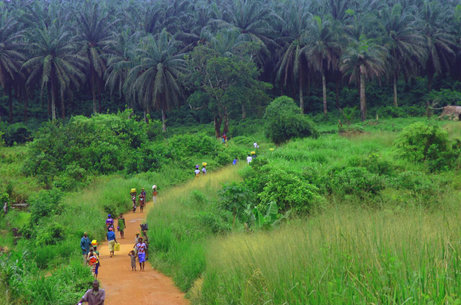
The Ebola outbreak in Guinea has been treated as a public health crisis, but it has more to do with a failure of central government, says Beatrice Bianchi.
The Ebola outbreak in Guinea has been treated as a public health crisis, but it has more to do with the failure of the central government to address local and regional concerns promptly and objectively, according to a new paper by a Gates Cambridge Alumna.
In an article entitled Forest Guinea, Instability Factors and Ebola for the Ifri (Institut français des relations internationales), Beatrice Bianchi argues that the Ebola crisis in Guinea highlights the role of socio-political marginalisation and geographical isolation in Forest Guinea, where the epidemic originated, in creating instability in the region and how this impacted on the spread of the virus.
She says it also brought to the surface the complex interrelations between communities, external actors and the state that characterise Forest Guinea. That includes misunderstood cultural practices and religious customs as well as external intervention through an increase in state and military presence, which, she says, “has fuelled distrust, fear, and ultimately weakened the traditional social fabric of the region”.
Traditional leaders were either unable or unprepared to deal with the crisis, she writes, which meant a concerted effort by national and international actors was required to stabilise the situation.
Bianchi, who did an MPhil in African Studies [2011], says a holistic and culturally sensitive strategy needs to be developed for long-term reconciliation measures to be effective.
She calls on the Guinean authorities to establish fair and independent legal procedures to foster peaceful ethnoreligious co-habitation and to eliminate the perception of favouritism and impunity towards non-native Malinke communities. She adds that the Guinean government should focus on improving statutory land use policies and regulations in Forest Guinea so that local customs are taken into consideration and business agreements should include local development as a priority.
Bianchi argues that the situation in Forest Guinea has implications for neighbouring countries facing similar issues.
She adds: “Given that the Ebola crisis is far from over and that in the next few months both Guinea and Côte d’Ivoire will hold presidential elections national governments and the international community should keep in mind the underlying fragility of the region. Special monitoring should be set up in these regions to guarantee transparency and equity of the vote in order to avoid political distrust and intercommunal tensions that could easily mutate into violence and chaos.
Bianchi, who is a political analyst and Sub-Saharan Africa specialist, was responsible for political analysis in the core team of European Union observers based in Conakry during the Guinean legislative elections in 2013 and is just about to take part in the monitoring of elections in Burundi.
She says: “Thanks to the experiences afforded by, and the nurturing community of the Cambridge Gates Scholarship, I was able to develop the contacts and gained the knowledge necessary to seek this post. It was during my time in Cambridge that I became aware of this very important role the European Union played in accompanying emerging countries as they transition to full democracy. I have had the constant support of fellow Gates scholars as I have prepared applications, done background research, and worked in the field. This latest experience in Burundi will take me to yet another African country on the verge of breaking a cycle of authoritarian government and economic instability. I hope to be able to observe and bear witness to a wholly free and democratic electoral process.”
Picture credit: Wikipedia.












